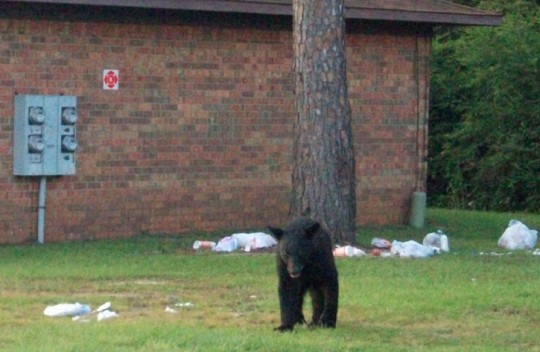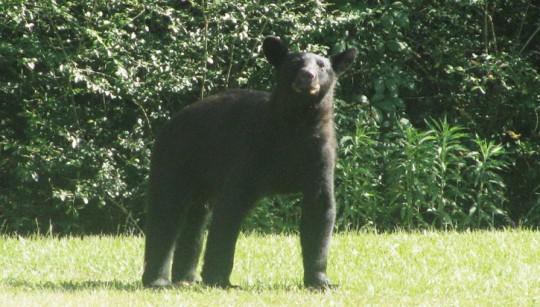Lawmakers Could Send Message: Don’t Feed The Bears
February 11, 2015
Florida lawmakers might increase penalties for people repeatedly caught feeding bears and alligators.
 Yet, individuals caught the first time illegally slipping food to certain types of wildlife not in captivity — bears and gators, along with foxes, raccoons, sandhill cranes, pelicans, and bald eagles — would only get non-criminal tickets, under a proposal starting to move in the House.
Yet, individuals caught the first time illegally slipping food to certain types of wildlife not in captivity — bears and gators, along with foxes, raccoons, sandhill cranes, pelicans, and bald eagles — would only get non-criminal tickets, under a proposal starting to move in the House.
The proposal comes as the Florida Fish and Wildlife Conservation Commission considers rules to allow limited hunting of bears, which are attracted to populated areas by unsecured trash.
The House Agriculture & Natural Resources Subcommittee on Tuesday agreed to support a bill (PCB ANRS 15-02) that would revamp penalties, including making it a felony for people caught feeding bears and alligators a fourth time.
Rep. Jennifer Sullivan, R-Mount Dora, said the current penalty structure, which imposes a second-degree misdemeanor on first-time violators illegally feeding wildlife, is “really hurting our ability to educate these individuals.”
The proposal is backed by the state agency, which expects a brief uptick in tickets to first-time offenders if the measure becomes law.
Wildlife officials are now “generally hesitant to issue a criminal citation to a first time offender,” according to a House staff analysis of the proposal.
The belief from the Fish and Wildlife agency is that by removing the stricter penalty for first-time offenders, there will be less chance those people will repeat as they learn the rules.
“Once issued a civil penalty, first time offenders should better understand the serious nature of violating the feeding rules,” the analysis said. “Therefore, these individuals will be less likely to incur criminal violations for future violations.”
A second-degree misdemeanor charge carries a penalty of up to $500 and up to 60 days in jail.
Under the proposal backed by Sullivan, first-time violators, regardless of the wildlife illegally fed, would receive a “noncriminal infraction” carrying a $100 fine.
The second-degree misdemeanor charge would kick in for people caught a second time.
Those caught feeding bears and gators a third time would receive a first-degree misdemeanor, while additional violations involving foxes, raccoons, sandhill cranes, pelicans, and bald eagles would remain a second-degree offense.
Rep. Katie Edwards, a Plantation Democrat who is an advocate for sentencing reform, asked Sullivan to revisit the penalties related to possible jail time for people feeding wildlife.
“Encouraging jail time is a bit excessive,” Edwards said. “There are other ways to better deter those folks than jail time.”
A third-degree felony charge involving feeding bears and alligator on fourth and subsequent convictions could carry a fine of up to $5,000 and the chance to spend up to five years in jail.
Currently, a fourth offense of illegally feeding wildlife within a 10-year period is a first-degree misdemeanor, which carries a minimum fine of $750, the chance for up to a year in jail and a three-year suspension of any recreational license.
Last Wednesday, the Fish and Wildlife Conservation Commission directed its staff to move forward with plans to address dangerous interactions between humans and black bears.
That includes proposing a draft rule in April that would allow hunting of bears, possibly as soon as this fall.
Thomas Eason, a division director with the Florida Fish and Wildlife Conservation Commission, told reporters Thursday that bears are attracted to suburban neighborhoods because of easy access to food.
by Jim Turner, The News Service of Florida
Pictured: A black bear at the Wild Oak Farms Apartments in Cantonment in 2012. NorthEscambia.com file photos, click to enlarge.
Comments
4 Responses to “Lawmakers Could Send Message: Don’t Feed The Bears”




Samantha in response to your comment. Where do you recommend a person who has horses live? Horse feed also attracts wild animals. Do you recommend they move their horses to the city? Your comment about respecting wild animals and moving to a place that doesnt have wild animals is a bit extreme -especially for those of us that have farm animals as well. It isnt always feasible to feed a dog or cat inside the house. Think about what you are advocating……..
Haley ~ The whole premise is partially because people feed their domestic animals outside which DRAWS the other animals to their property. This puts everyone involved at risk. If you live around these wild animals, feed your pets indoors ALWAYS and also bag and secure your trash in containers so that the wild animals cannot get to or into them. This is also a huge reason that there is so much animal/human interaction. If you want to co-exist with wildlife and you live in an area that they live, these guidelines are for the safety of both of you. Wild animals have a right to live and roam just as you have a right to live and dwell. But if you can’t respect the animals rights then perhaps it is better that you move to an area that is not so populated with wildlife. Co-existing is not about what the animal should do to make you comfortable. The human has the intelligence and the animal has wild instincts. WHO do you think is better to try and control and aid in a much more enjoyable and safe co-existence? Yes, you are.
Maybe this could apply to those (individuals/groups) that are along the roadside and intersections as well. So many resources and available help, yet so many bums looking for a handout…money!
Isnt this a little extreme? Making it a crime to feed wildlife? I see a big problem with this as it relates to raccoons in particular. Some ppl feed their cats or dogs outside either on the porch or patio. If one lives in the country or near woods, there is the occasional racoon or possum that wanders up and eats the leftovers. This is gonna be a problem for a lot of ppl. Will this be considered? This is an example of not intentionally feeding the raccoon or possum but one in which it simply wanders up on the property and takes it upon itself to feed on leftovers. I don’t agree with this proposal. I think we have gotten too extreme in issuing citations. I don’t think we should purposely go out and feed the bears and gators, etc. But……..And this hunting of black bears is appalling and sad.